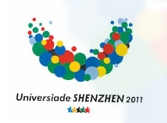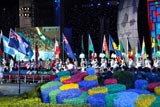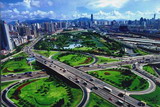Torch lights way for Shenzhen Universiade
Updated: 2011-08-13 08:13
By Lei Lei (China Daily)
|
![The opening ceremony of the 26th Summer Universiade is held on Friday night in Shenzhen, Guangdong province. [Cui Meng / China Daily] Torch lights way for Shenzhen Universiade](../../../images/shenzhen2011/attachement/jpg/site1/20110813/0013729e48090fb0049d04.jpg) |
|
The opening ceremony of the 26th Summer Universiade is held on Friday night in Shenzhen, Guangdong province. [Cui Meng / China Daily] |
SHENZHEN - Young people from all over the world started their sports gala in Shenzhen, as Chinese President Hu Jintao declared the 26th Summer Universiade open in China's southern city on Friday.
With the slogan of "Start Here, Make a Difference", the Shenzhen games attracted more than 7,800 athletes from 152 countries and regions across the world. It will be the largest-ever games in the history of Universiade.
|
 |
"The FISU Family, the athletes, coaches and administrators standing here before you tonight are honored and proud to be with you in Shenzhen and they look forward to performing their very best for you during this Universiade that is the biggest event ever organized in FISU's history," George Killian, president of the International University Sports Federation (FISU), said at the opening ceremony, which was held by the side of Shenzhen Bay.
Established in 1949, FISU has promoted the sports values of friendship, fraternity, fair play, perseverance, integrity, cooperation and application among young people. The Universiade, which was inaugurated in 1959 in Turin, Italy, aims at providing opportunities for university students worldwide to communicate with each other and show their commitment to peace and friendship.
"I expect that regardless of the duties and titles, you will have the opportunity to meet new people. We all know that you are here to compete, but international university sport is also about gathering people from different regions and cultures. So do not miss out on this unique opportunity," Killian said.
It is the second time China has hosted the Universiade, which was held in Beijing in 2001.
The opening of the huge "door of the world" at the back of the stage started the opening ceremony of the Shenzhen games at the Stadium of Shenzhen Bay Sports Center.
In the shape of the sign @, the stage of the ceremony highlighted the youthful vitality that characterized both the image of Shenzhen and university students.
"Shenzhen is a young city of miracles. I am sure that all of you will make a difference here and create your own miracles," said Yuan Guiren, president of the organizing committee of the Shenzhen games.
Zhou Ziqian, a graduate of Shenzhen University, who bicycled across China to promote environmental protection and the Universiade, brought the torch of the games into the stadium.
After being passed among another five torchbearers, including Olympic gymnastics champion Cheng Fei and ambassador of the Shenzhen Universiade, Deng Feifei, the flame was ignited in the main caldron by China's star hurdler Liu Xiang and four students from other continents.
As one of China's sporting icons, men's 110m hurdler Liu gained his first world title in the Beijing Universiade in 2001 when he was 18 years old. Then he began to make history, from breaking the Asian and world records to winning Olympic and world championship gold medals.
The torch of the Shenzhen Universiade was lit at Tsinghua University in Beijing. The torch relay started at Peking University, and 10 million netizens followed the torch relay on the Internet.
The flame surged toward the sea, flying upward to ignite the 26-meter high cauldron, on which is engraved the history of 26 Universiades in the shape of piles of books.
There are 306 gold medals on offer from 24 sports at the 12-day Shenzhen games. The Chinese delegation is the largest one with more than 800 athletes, coaches and officials.
China ranked second in the medal tally at the last Summer Universiade in Belgrade, Serbia, two years ago, following Russia.
Related Stories
Opening ceremony starts for Shenzhen Universiade 2011-08-12 20:59
China sends biggest-ever delegation to Universiade 2011-08-12 20:48
Universiade makes Shenzhen learn to solicit public opinion 2011-08-12 18:34
In the hours leading up to Universiade opening 2011-08-12 20:37
Hu: Shenzhen Universiade to be unique and high-standard 2011-08-12 14:33
Hu foresees a unique, high-standard Universiade 2011-08-12 14:49
Video

Working as a Universiade volunteer

Party starts as Universiade ends

Sumptuous seafood in Shenzhen

Athletes test doping knowledge
About Shenzhen

